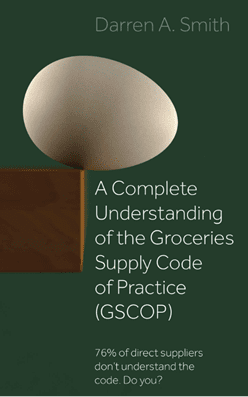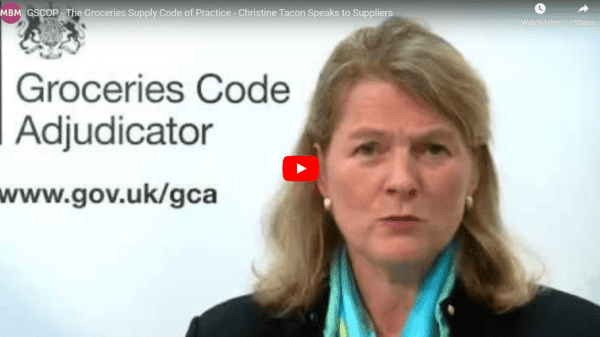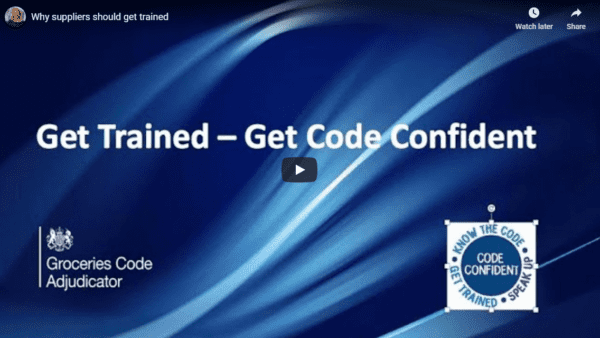76% of Suppliers Don’t Understand the Code. Do You?
We learn More About GSCOP with the GSCOP Book
Do you work in the world of supermarkets, suppliers, groceries, or FMCG, in the UK? You are probably aware of something called ‘GSCOP’ or heard of ‘GSCOP’ rules, or ‘GSCOP regulations’. And this stands for ‘Groceries Supply Code of Practice’. The GSCOP Code of Practice was implemented by the UK Government to encourage major UK supermarkets to treat suppliers fairly. Like guidance or set of rules. And to help you understand the Code better, we have created the GSCOP Book:
Buy the GSCOP Book – Click Option 1, 2, or 3
For £9.95 you can buy the 74-page book on either:
- Digital book from Amazon.co.uk (Read the 4.5/5 reviews)
- Paperback book from Lulu.com
- Preview on Google Books
‘Did You Know?’ Facts
- Training of supermarket buyers is a legal requirement.
- Written to help supplier relationships with the major UK supermarkets
- 76% of suppliers do not understand the Code (Source: GCA Annual Survey 2015).
- The Groceries Code Adjudicator has the power to fine a supermarket up to 1% sales
- Iceland has the worst compliance code record.

The Importance of Training Suppliers: Christine Tacon, the Groceries Code Adjudicator

Listed on the government’s training provider directory.
Testimonials to Read the Book
“Whilst I already have a good understanding of the Groceries Supply Code of Practice, the GSCOP book re-affirmed what I knew. But more importantly, brought to the forefront of my mind some of the peripheral parts of the code I’d overlooked. It is easy to understand and breaks the topic down into manageable work areas. Moreover, the book provided some of the more junior members of the team, who were less conversant with this subject, a good introduction on how the code can help them in practice.”, by Chris White, Account Director at Karro Food Group.
“A comprehensive treatment of the issue and a must-read book for account managers handling the major supermarket multiples. Written by someone who has actually worked in the industry, Darren’s book gives some practical insights for suppliers on the Code. And, in particular how it needs to form part of the decision-making process when dealing with the supermarkets.”, by Mark Craft, Editor at EMR-NAMNEWS.
“I believe it is essential that every commercial manager has an awareness and understanding of Groceries Supply Code of Practice. This is the playing field by which our retail customers now operate. You need to understand the rules to be able to compete and grow. Ignorance is no excuse, the market has moved on.”, by Alan Chapman, Acting Managing Director, Walkers Sausage Co.
GSCOP Book vs Training Course
There is Groceries Supply Code of Practice training available. Because at MBM we prefer to save you £500 and a day of training by offering you a book. A strange statement coming from a training provider. It is because we believe in the importance of this legislation and that you can achieve your goals by reading a book, which you can reference back to, rather than a training course, where you are learning a skill. Our recommendation is to buy the book and then combine that knowledge with influencing skills and/or negotiation skills to be most effective. And to learn a skill please see our range of products.
Take Our Quiz to See How Well You Know the Code!
Test your Knowledge and Start the Quiz.
Join the Groceries Supply Code of Practice Aware Association
The GSCOP Aware Association has been formed with one mission – To be the mark for Suppliers to demonstrate that they are Aware. New members must pass an online assessment to join. But we envisage two-thirds will fail.
Book a Masterclass with the GSCOP Book Author
Raise awareness for you and 11 others by discussing this topic with the Author at a GSCOP Book Author Masterclass. Each attendee gets a free copy of the book.

Seeking Legal Advice
When dealing with legal documents, a potentially complex legal process, and high stakes, we advise that you seek legal counsel. And our partners at Wragge Lawrence Graham & Co (Gowling WLG from mid-January 2016) can help. Contact David Lowe – Their expert, from a legal perspective, who is very experienced in advising suppliers on the Groceries Supply Code of Practice. Indeed, David is offering a free 20-minute telephone/email consultation when you mention this book.
Seeking Trained People
Supply Chain Online is the UK’s leading Supply Chain, Procurement and Logistics job board. Now in its 10th year, Supply Chain Online provides targeted recruitment advertising to the UK’s leading employers.
YouTube
Take a look at our YouTube channel where you will find stacks of useful tutorials like the one below;

Read Excerpts From the GSCOP Book
Chapter 2.
Just Tell Me What I Need to Know
We collaborated with some friends in the UK Grocery Industry on writing this book. They wanted a chapter on the ‘good bits’. The challenge with the Order and the Code is that the devil is in the detail. This chapter is for those people that just want to know the ‘good bits’. I have been told by Sales Directors and Account Managers that ‘We have the attention span of a gnat’. But the risk is that the devil is in the detail. And these are the rules of the game you play. It’s ok not knowing the detail of the offside rule unless you are a footballer! I urge you to read this chapter and then other chapters to understand the detail.
The ‘Good Bits’ are that major UK Supermarkets now need to adhere to these rules:
- Ensure the terms of supply are recorded in writing.
- Provide the Supplier with a notice setting out its GSCOP obligations, including the identity of the senior buyer.
- Deal fairly and lawfully, applying good faith, without duress and recognising the Supplier’s need for certainty.
- Not making supply arrangements retrospective, unless in accordance with specific detailed arrangements in the Supply Agreement.
- Give reasonable notice to vary Supply Agreements or to make significant changes to supply chain procedures.
- Avoid delay in making payment.
- Not require payment to marketing costs, unless specifically stated in the Supply Agreement.
- Avoid charging for shrinkage.
- Not require payment for wastage, unless as stated in the Supply Agreement.
- Not require payment of a listing fee, except in relation to a promotion or for new products.
- Compensate the Supplier for the designated Supermarket’s forecasting errors. Except as expressly stated in the Supply Agreement, or where the supermarket acted with due care and good faith.
- Not insist the Supplier obtains goods, services or property from a third party unless cheaper than the Supplier’s source.
More rules…
- Avoid asking for payment for better positioning of goods unless in relation to promotions.
- Not require the Supplier to predominantly fund a promotion. Reasonable notice must be given to the Supplier of a proposed promotion to which the Supplier will contribute. But the Supermarket must take due care not to over-order a promotion.
- Not require payment for resolving consumer complaints unless due to Supplier’s breach and certain other controls.
- Only de-list the Supplier with reasonable notice and for genuine commercial reasons.
- All of this is supported by obligations on the designated Supermarket. That includes training staff, appointing an in-house compliance officer, and issuing an annual report. A summary of which needs to be included in the designated Supermarket’s annual company report.
Action
For many of the statements above exceptions apply, as with any piece of legal writing. Therefore, it is essential that you understand the exceptions. Please go to the contents and choose the next chapter to read. Do you know which Supermarkets are covered by the Code? Are you aware if your products are included within the Code? Do you know which Supermarkets are most compliant?
Chapter 11.
How do I use The Groceries Supply Code of Practice (GSCOP)?
You have read some of the histories, read some of the excerpts from the Order and the Code. You must be thinking, ‘How do I use this?’ This question comes from the pragmatist learning style (Link) and is very valid. And as professionals in the UK Grocery Industry too, we know that you want a practical guide. Here it is!
Supply Agreements
You should have a Supply Agreement in writing and a copy of the Supermarket’s terms and conditions. Then you know what is agreed and what is not agreed. A Supermarket can no longer ask you for payments for what has happened retrospectively. For example, funding a promotion that has already started.
Action: Respectfully request, or propose a Supply Agreement. 56% of suppliers have a written Supply Agreement. It is a legal requirement for the Supermarket to have this with you. But you will struggle to work with the Code if you do not have a written Supply Agreement.
Supply Chain
The Supermarket can no longer change part of the supply chain that affects you without giving reasonable notice. For example, asking for an additional delivery day in the week or delivering twice a day to start next week.
Action: Ensure that you and your colleagues in Supply Chain are aware. Discuss challenges internally around GSCOP before you reply to the Supermarket.
Payment terms
The Supermarket must pay the invoices according to the written Supply Agreement. For instance, if you have agreed to 90-day payment terms then it must adhere to avoid breaching the Code.
Action: Understand whether you are paid on time and discuss internally. Then decide if this is an issue that you wish to raise with your Supermarket.
Marketing costs
You cannot be asked for payments towards buyer visits, artwork packaging and design. Also consumer and market research, store openings and refurbishments or hospitality. That is unless these costs are written into the Supply Agreement.
Action: Find out whether any member of your team is agreeing to these payments. And then discuss internally whether you wish to raise this issue with the Supermarket.
Shrinkage and Wastage
The Supermarket shall not require the Supplier to make payments for shrinkage or wastage. That is unless it is caused by Supplier negligence, or set out in the Supply Agreement.
Action: Find out whether any member of your team is agreeing to these payments. And then discuss internally whether you wish to raise this issue with the Supermarket.
Listings and Positionings
You cannot be asked to pay for listings or positioning on a shelf, or to gain more shelf space. That is unless it is in relation to a promotion. But another exception applies regarding a listing over time and percentage distribution.
Action: Find out whether any member of your team is agreeing to these payments. And then discuss internally whether you wish to raise this issue with the Supermarket.
Compensation for Forecasting Errors
The Supermarket must fully compensate the Supplier for any costs incurred through forecasting errors. But exceptions apply.
Action: Discuss the last 12 months internally and the potential value of the compensation. Then agree on whether to raise the issue with your Supermarket. In March 2016 the GCA published a best practice statement on Forecasting, which is worth reading.
The 1.5-page document largely states that the GCA believes that Supermarkets are complying with the Code. And also that Supermarkets should improve their transparency of communications with Suppliers about forecasting.
Third-Party Goods and Services
You do not need to obtain goods or services from a company appointed by a Supermarket that receives a payment. But exceptions apply.
Action:. Find out whether any member of your team is agreeing to work with an appointed provider that receives payments. And then discuss internally whether you wish to raise this issue with the Supermarket.
Promotions
You should not be the predominant funder of a promotion.
Action: Review the last 12 months internally and the potential value of moving from ‘predominant’ to ‘not predominant’. And then agree about whether to raise the issue with your Supermarket.
Customer Complaints
The Supermarket cannot ask for payment for complaints made by shoppers in the store. But the Supermarket can ask for payment for complaints that are not resolved in-store. However, the watchword is that the payment must be ‘reasonable’. Exceptions apply.
Action: Discuss the last 12 months internally and the potential value of the compensation. Then agree on whether to raise the issue with your Supermarket.
>De-listing a Supplier
You can only be delisted for genuine commercial reasons. And reasonable notice must be provided with the reasons for the de-list in writing.
Action: If this is likely for you to understand the Code comprehensively for this section. And read these guidance notes from the GCA (Link).
Action
The Code came into play almost 15 years ago, (not the GSCOP Code, but the first code of its type). It has been strengthened to support Suppliers and an Adjudicator appointed. Are you aware of exactly what you can and cannot be asked for by major Supermarkets? To use the Code effectively, the knowledge of the Code needs to be successfully combined with powerful Negotiation Skills and Influencing Skills.
Chapter 18.
What was the Tesco investigation by the GCA about?
In February 2015 the Groceries Code Adjudicator, Christine Tacon, launched an investigation into Tesco (Link). The reason was that the GCA had formed a reasonable suspicion that the Supermarket had breached GSCOP. The decision was made having considered information relating to the profit statement announced by Tesco in September 2014.
The investigation was likely to take 9 months. And looked at the conduct of Tesco from the 25th June 2013 to the 5th February 2015. It concluded in November 2015 and focused on:
- Delay in payments.
- Payments for better positioning of products on the shelf.
- The principle of fair dealing.
The investigation was only with Tesco, though. If evidence came to light about similar practices from other Supermarkets, the scope of the investigation could be widened. Christine said, “This is the first investigation I have launched and it is a significant step for the GCA. I have taken this decision after careful consideration of all the information submitted to me so far. I have applied the GCA published prioritisation principles to each of the practices under consideration. And have evidence that they were not isolated incidents, each involving a number of suppliers and significant sums of money.”
Action
Please stay abreast of the development of the Tesco investigation. And if you connect with us on social media we’ll keep you informed.
The Tesco investigation concluded in January 2016 with a 60-page report. And at the Annual GCA Conference Christine had made these 5 recommendations to Tesco:
- Money owed to suppliers must be paid in accordance with the terms agreed. Tesco must not make unilateral deductions – 30 days for suppliers to challenge proposed deduction.
- Data input errors identified by suppliers must be resolved promptly – within 7 days.
- Tesco must provide transparency and clarity in its dealings with suppliers.
- Tesco finance teams and buyers must be trained in the investigation findings.

For further Groceries Code information, take a look at our Ultimate Guide to GSCOP. Also, you can find further insight, detailed definitions and clarification of all the key GSCOP terms mentioned in this guide in our Glossary of Terms.
Contact Us
Feel free to get in touch to find out how our GSCOP Training with the author Darren A. Smith can help you. Simply fill out the form , and we will be happy to get back to you with further information.